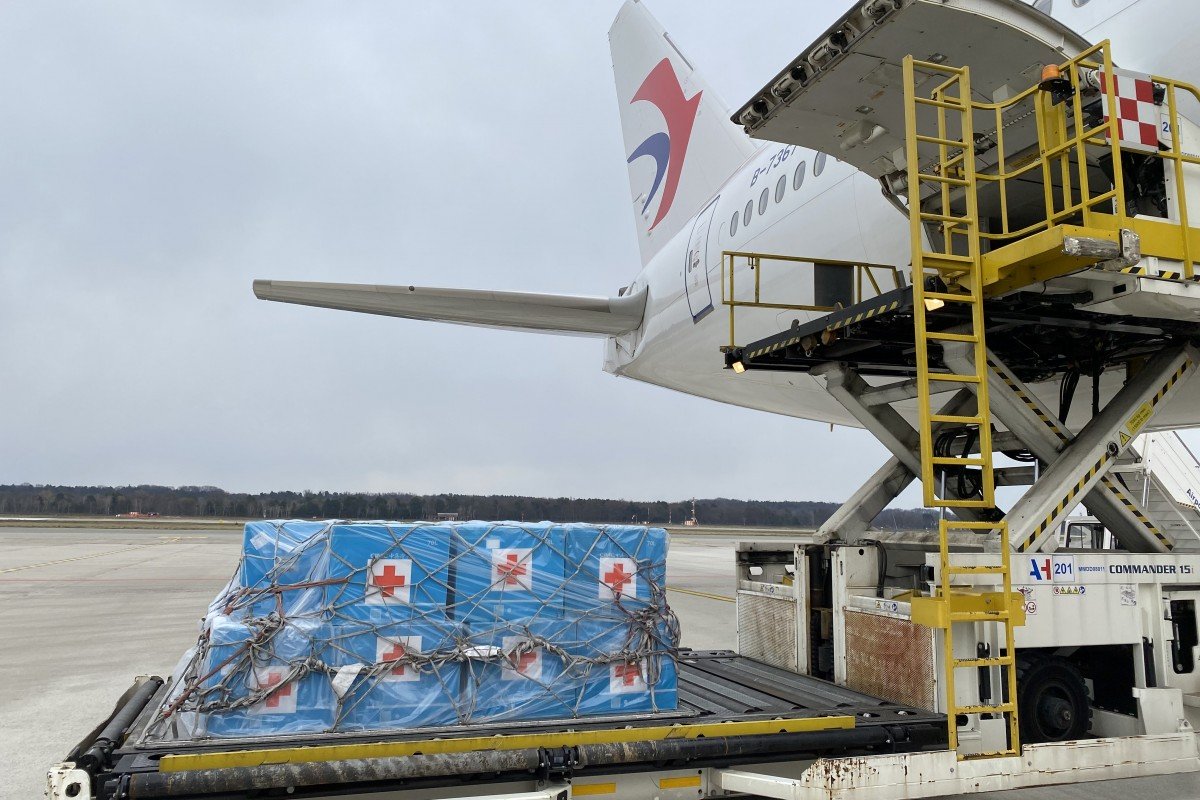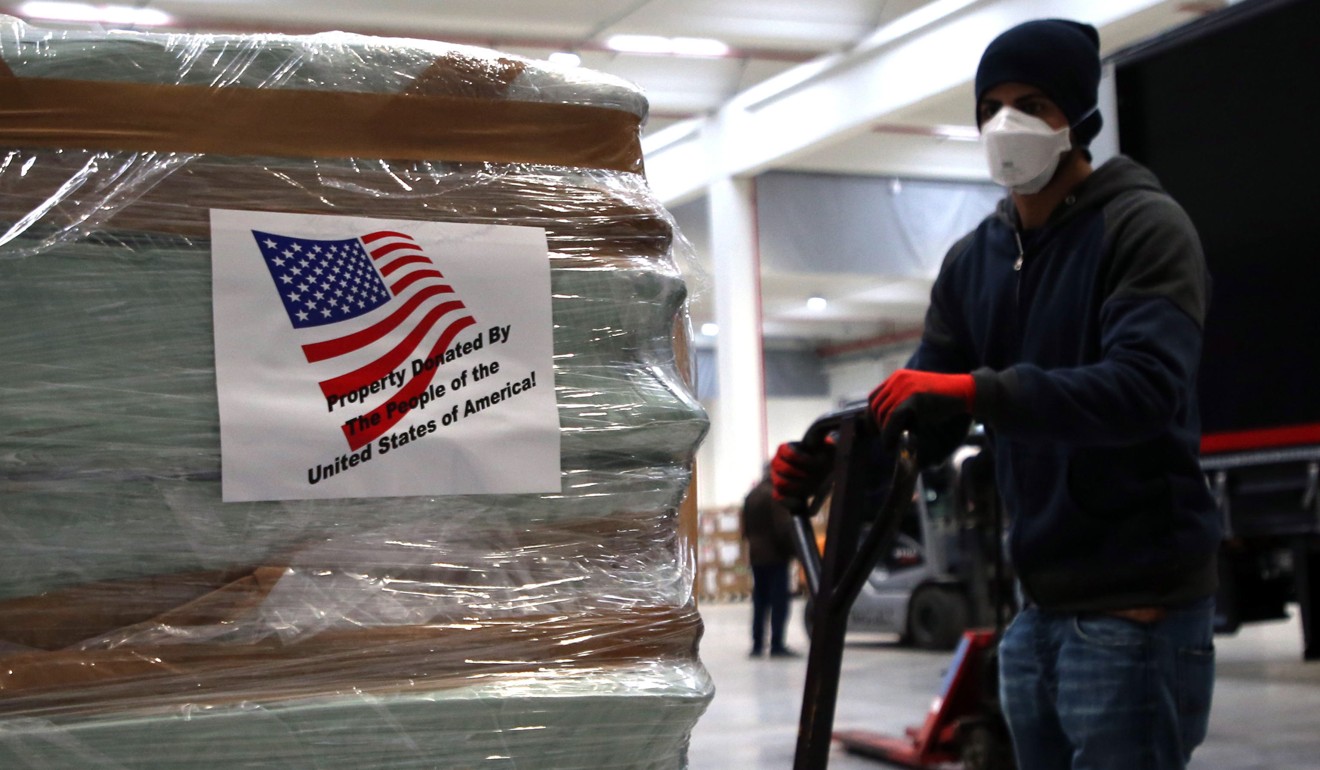
But Beijing’s efforts – which state media has called “China’s solution to fight the pandemic” – have had a mixed response, and analysts say its “mask diplomacy” will do little to convince critics in the West.
Other countries have also offered help to those badly affected by the crisis. German hospitals this week said they were taking in critically ill Covid-19 patients from Italy and France.
The US Army Europe said it had delivered medical supplies and equipment – including hospital beds, mattresses and adjustable IV poles – from its base in the Italian port city of Livorno to the hard-hit region of Lombardy. US Secretary of State Mike Pompeo said earlier that the country had offered more than US$100 million in medical aid to other nations – including long-time enemy Iran.

And on Thursday, the European Commission said it would allocate €38 million (US$41.7 million) for health sectors and €373 million for social and economic recovery in the Western Balkans “to confirm we stand by the region” in the coronavirus fight.


Across the globe, more than 3 billion people are living under lockdown measures to limit the spread of the virus, which has infected nearly 570,000 people worldwide and killed over 26,000.
China, where more than 3,200 people have died from the disease, has extended help to countries in Europe, the Middle East, Africa and Asia. It is not the first time it has offered humanitarian aid during a global health crisis, but according to Beijing officials it is the largest such effort since 1949.
Luo Zhaohui, deputy foreign minister, on Thursday said Beijing had offered emergency aid – including test kits and masks – to 83 countries because “China empathises and is willing to offer what we can to countries in need”.
He also said the country wanted to share its experience of fighting the pandemic with the world.
But China’s response has drawn concern in the West, with critics accusing Beijing of seeking to divert attention away from an initial cover-up of the outbreak in Wuhan, which some health experts say could have delayed the international response to what is now a global pandemic.
Marcin Przychodniak, an analyst at the Polish Institute of International Affairs, said countries receiving supplies, particularly in Central and Eastern Europe, would appreciate Beijing’s support, but there were worries about the potential political and economic motives behind it.
To secure those medical supplies, governments had to “cooperate directly with the Chinese authorities in order to be able to order medical goods”, Przychodniak said.
“There are possibly strings attached such as underlining the Chinese narrative of ‘wise leader and successful political system’ which helped to overcome the virus in China, by European partners,” he said.
Miwa Hirono, an expert on Chinese foreign aid at Ritsumeikan University in Japan, said unlike the medical assistance Beijing provided to West Africa during the Ebola outbreak from 2014 to 2016, its “mask diplomacy” was often linked with the assumption that “China is trying to take the world leadership by improving its image and enhancing its soft power by providing masks”.
But Hirono said Beijing’s motives could not be fully interpreted in that way.
“So many other countries have also offered help. Everyone wants to improve their image, so it is not just China,” she said. “No matter how legitimate these concerns may be, linking up everything China does to China’s quest for the world leadership, without thinking about the context and history of humanitarian assistance, blinds us from the true nature of China’s action.”
Other countries that have delivered badly needed supplies include Russia, which, despite tensions with the West, sent 14 military aircraft with experts and medical supplies to Italy. Russia’s top envoy in Washington also said the country was ready to help the US combat the virus.
Cuba – hit by decades of US sanctions – made headlines when it sent an emergency contingent of doctors and nurses to Italy. It also sent medical teams to Venezuela, Nicaragua, Suriname, Jamaica and Grenada.
South Korea donated more than 15,000 test kits to the Philippines, while Taiwan – a self-ruled island that Beijing regards as part of its own territory – said it would send 100,000 protective face masks to the US every week. Taiwanese officials also pledged to donate 1 million face masks to Paraguay, one of Taipei’s few allies in South America, after Beijing made the same offer.
Such offers from Beijing, according to Hirono, were unlikely to do much to improve its image abroad.
“In the short term, those countries that receive masks and medical equipment will appreciate China’s assistance,” she said.
“But long term, it is hard to imagine those countries that were originally concerned about China’s international behaviour – say the issues of human rights, technology and [creating] debt traps, among others – will suddenly forget all those problems and buy into China’s soft power, simply because China gave them masks.”
Nov 30, -0001
Nov 30, -0001
Nov 30, -0001
Nov 30, -0001
Nov 30, -0001
Nov 30, -0001
फेसबुकबाट तपाईको प्रतिक्रिया